Best CRM Practices That Will Help Your Business Thrive
What if instead of reaching more people, you sought to reach people more?
The evolution of Customer Relationship Management (CRM) tools has been remarkable. Modern CRMs exhibit heightened capabilities and intricacies, demanding a comprehensive understanding of CRM best practices to maximize the returns on your CRM investment. These best practices encompass the meticulous selection of the most suitable CRM software for your unique requirements, adept customization of your CRM system, and the vigilant handling of CRM data to ensure its value and integrity remain safeguarded.
Stop Selling. Start Serving.
CRM holds significant significance across all businesses, increasing profitability, productivity, customer loyalty, and satisfaction. Diverse CRM software options cater to varying industries and list sizes. A potent CRM involves crafting strategies, engaging in activities, and utilizing channels to adeptly manage communication while nurturing relationships with both existing and potential clients.
Why You Need a CRM Strategy
A CRM strategy offers substantial advantages to your business, such as:
- Fostering a culture of collaboration throughout your organization.
- Enhancing the management of sales leads with greater precision.
- Crafting marketing campaigns that are precisely tailored and personalized.
- Readily identifying promising growth opportunities and revenue prospects.
- Delivering superior service to both existing and potential customers.
- Extracting insights and data for precise forecasts of future performance.
Below is our list of the best CRM best practices for 2023.
1. Choose the Right CRM to Suit Your Requirements
Every CRM isn’t a one-size-fits-all solution. Some CRMs cater better to small businesses, while others excel in marketing, and some are tailored for budget-conscious companies seeking free CRM options. Among the variety of solutions, such as Zoho CRM, certain platforms can effectively address a range of business needs.
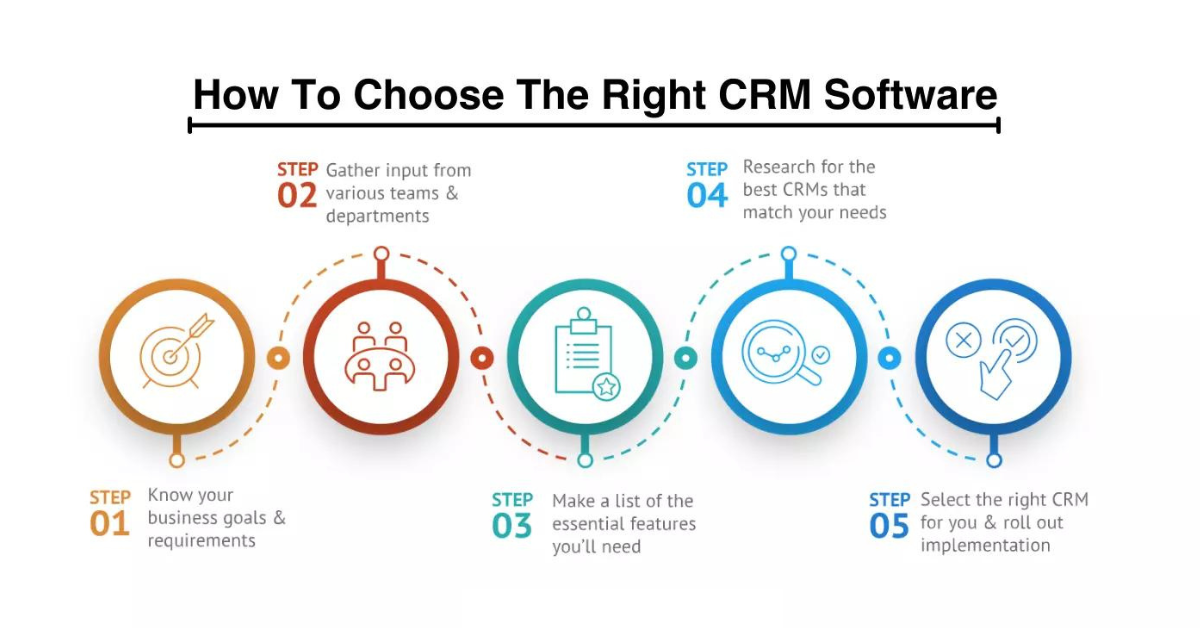
Before committing to a CRM, it’s essential to conduct thorough research to identify the ideal fit for your specific business demands. Define your purpose for adopting a CRM – whether it’s enhancing customer relationships, automating critical sales and marketing functions, or optimizing customer service processes. Additionally, a well-selected CRM can provide insights into customer behaviour, enabling you to enhance both service and sales.
Diverse types of CRM applications are available, including operational CRMs, analytical/marketing CRMs, and collaborative CRMs. Gaining an understanding of the advantages and disadvantages of each CRM category will guide you in selecting the optimal CRM solution for your organization.
What Key Factors Should You Consider Before Purchasing a CRM? Our recommendation is to explore various examples of CRM software. Delving into different choices will facilitate your grasp of available features and the range of costs associated with various CRMs.
2. Set Clear Goals
Developing an impactful CRM strategy requires the establishment of clearly defined CRM goals. A foundational goal for every CRM solution revolves around enhancing customer satisfaction by leveraging CRM data to curate a meticulously planned customer experience. While driving increased sales remains a primary focus for many organizations, there are additional key CRM goals you want to consider.
- Monitoring Crucial Sales Metrics
- Enhancing Customer Service and Sales Team Efficiency
- Automating Customer Reporting
- Deepening Understanding of Buyers’ Journey
- Refining Customer Segmentation
- Elevating Customer Retention
- Crafting Accurate Business and Sales Forecasts
- Shortening the Sales Cycle
- Efficient Sales Cycle Management
- Informed Marketing Investment Decisions
- Identifying Prime Leads
- Reducing Acquisition Costs
- Enhancing Customer Lifetime Value
3. Tailor Your CRM For Optimal Fit
Strategically customizing your CRM software to align with your specific needs which is easier done with some solutions than others. CRM software varies regarding the level of customization allowed. In a general context, the extent of tailoring your CRM experience correlates inversely with the cost of the CRM itself.
Various exceptional and highly adaptable platforms are available in the market. A prime example is Zoho CRM, which is equipped with a foundation of 15 standard modules. However, you have the flexibility to augment it with custom modules tailored to suit your industry or specific needs. Zoho CRM’s advanced filters empower you to construct personalized dashboard views. Moreover, the capacity for customization extends to configuring validation rules, establishing conditional fields, incorporating custom components, and forging inter-dependencies among custom fields.
Another powerful CRM software is Pipedrive, popular for its substantial customization capabilities. Within Pipedrive, you are able to generate customized reports and configure individualized dashboards, and sales pipelines. Pipedrive’s open API lets you customize your CRM by easily integrating it with other apps and adding more functionality and power to your CRM.
4. Automate Wisely
Leveraging the potential efficiencies inherent in CRM automation empowers you to fully harness the capabilities of your CRM system. Strategic identification of areas for automation not only optimizes your team’s time utilization but also curtails sales expenditures and guarantees the seamless execution of critical tasks.
Furthermore, CRM automation can be effectively employed to streamline project workflows, re-engage unresponsive contacts, and maintain clients abreast of project advancements. Lead scoring, sales projection, proposal management, and procedural workflows all stand as viable candidates for automation.
Additionally, automation emerges as a valuable tool to promptly alert you to the most pertinent CRM metrics, encompassing purchasing trends, sales team performance, conversion rates, and performance patterns that might otherwise evade notice.
5. Train Users Effectively
One of the main reasons CRMs fail is low user adoption. Your CRM will fail if your team does not recognize the enormous advantages of it or if they are not adequately taught in its use. Because of this, creating a strong user training program is an essential CRM best practice.
Getting organization-wide buy-in for your CRM will help warm users to the importance of building their CRM competencies. Your team will have fast access to the forms of training that are most effective for them if you establish training programs in a variety of formats, such as group sessions and self-paced training that is given in person or online. Gamification can increase user engagement and learning retention in your training programs.
Bottom Line
A CRM is a powerful tool for businesses to store, arrange, and handle vital customer information. A thoughtfully crafted CRM uncovers valuable insights that can be challenging to uncover independently, leading to increased profits. By adopting the top CRM best practices outlined in this guide, you can fully leverage your CRM’s capabilities. This, in turn, enhances customer satisfaction and optimizes sales for your business.
Elevate your business to new heights by embracing the pinnacle of CRM practices with Allied Consultants. Don’t settle for mediocrity when it comes to customer relationship management. Our expertise and guidance can empower you to unleash the full potential of your CRM, revolutionizing the way you engage with customers and drive sales.

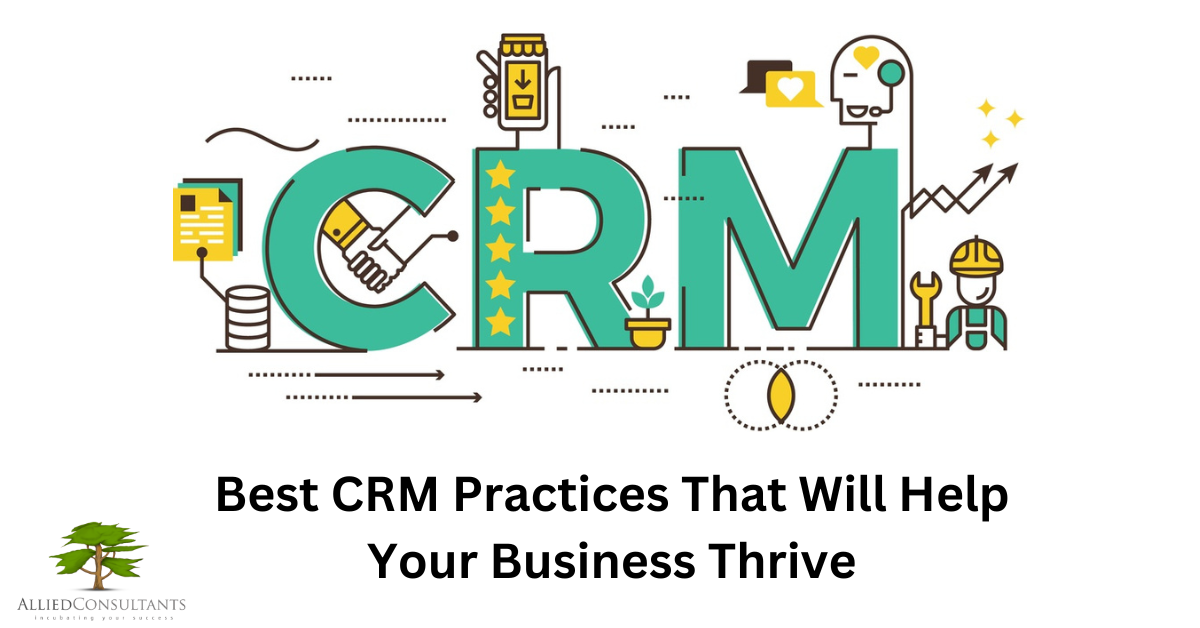
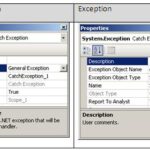
![[Case Study] Imports Management Portal uses Cloud Printing to get 3x better at Customer Services](https://alliedc.com/wp-content/uploads/2015/04/Cloud-Printings-150x150.png)
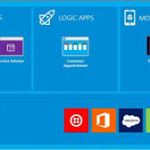
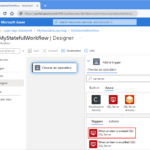
![[New Questionnaire] Self-discover your organiation’s Big Data Maturity Stage](https://alliedc.com/wp-content/uploads/2015/08/BD-Images-150x150.jpg)
![Energy Business Outlook 2016 [Infographic]](https://alliedc.com/wp-content/uploads/2016/05/Key-Findings-Oil-and-Gas-150x150.png)